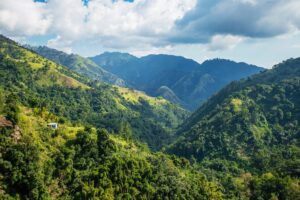While driving home the message that nothing is more important than physical health and wellbeing, the past year of pandemic stress has also increased focus and attention on the subject of mental health.
As risk factors for depression and anxiety rose, so did their prevalence across all segments of society (even Michelle Obama talked about experiencing “low-grade depression” in an August episode of her podcast). When the world reopens to tourism in the near future, travelers seeking wellness experiences will have an emerging trend to consider: mushroom therapy and the magic mushroom retreat.
Legal in destinations like Jamaica, Brazil, the Samoa and the Bahamas (and decriminalized in others), psilocybin tourism is driving travelers to these places to experience the wellness benefits of psychedelic mushrooms in a way that extends above and beyond the magic mushroom trips one might have taken in college. Instead, luxury retreats welcome high-net-worth clientele in search of self-improvement, emotional growth and psychological healing.

“We get lots of wealthy professionals who are either looking for spiritual growth, or to help boost creativity. We’ve had a cross-section of both male and female professionals, from doctors, and investment bankers, to film directors, CEOs, and start-up founders,” said Paul Austin, founder of Synthesis retreat in Zandvoort, Netherlands in an interview with Amuse.
Even Gwyneth Paltrow is on board, sending a select group of her goop staff to a Jamaican retreat and documenting their trip on her Netflix series, “The Goop Lab.” The episode served to highlight the key differences between taking magic mushrooms recreationally versus engaging in guided mushroom therapy.
The role of facilitators at mushrooms retreats
So-called “bad trips” come down to three things: inappropriate dosage, inappropriate set (the expectation or intention going into the experience) and inappropriate setting or environment. Mushroom retreats carefully control these three factors. Participants feel encouraged to let go — of names, job titles, gender, time — in an effort to step away from the concept of control when it comes to the conscious direction of our own thoughts.
Guides are present to help participants when difficult ideas or emotions arise.
“We kind of think of it more of talking them through it, rather than down,” said Matthew Johnson, PhD, associate professor of psychiatry and behavioral studies at Johns Hopkins University in an interview with Healthline. “I know it’s a nuance, but the idea is not distraction, not to just go, ‘Oh, get your mind off of whatever’s bothering you,’ but rather look it in the eye and kind of courageously go through it with our help and support.”
The benefits of psilocybin tourism
“I felt a change in my perspective on life even after the very first three-gram dose, but the full transformation didn’t come until after my third dose, which was 10 grams,” Troy Wythe Candor told CultureTrip about his experience at Jamaica’s MycoMeditations. Candor had previously suffered from depression and suicidal ideation. He considered the retreat a last-resort option. “I felt like a different person. The effects of the psilocybin and the journey it took me on were undeniable. Everyone in my life who knew me before and after was amazed at how changed I was, including everyone at the retreat with me.”

At these retreats, psilocybin is often referred to as medicine. In South and Central America, mushrooms are used ceremonially by Indigenous peoples and have been for centuries. The Aztecs used magic mushrooms to open a pathway to the divine. Today, we might be more inclined to describe the experience as opening up pathways within our own minds. But both perspectives incorporate the goal of processing the things that happen to us over the course of our lives and making meaning from that understanding.
“One way in which classical psychedelics help with issues like depressive, addictive and obsessive disorders is by allowing the brain and mind to ‘break out’ of repetitive and rigid styles of thinking, feeling, and behaving,” said Peter Hunt, co-founder of Mind Medicine Australia, in an interview with News.com. “We know this from brain imaging data that psychedelics reduce the amount we persistently rethink the same thought . . . psychedelics appear to facilitate an opportunity to break free from mental ‘ruts’ and promote fresh perspectives.” The system for accessing this brand of wellness, however, remains flawed. While sliding-scale options and funding assistance are occasionally available for low-income travelers, psilocybin tourism retreats (plus the cost of getting there) have a higher price tag associated with them than a more conventional wellness destination.
For accessibility to increase in any real way, Canada will need (at the very least) to decriminalize mushrooms for personal use in the way that Spain, Italy, Portugal, Austria and other countries have done.
